Controlling mosquitoes on a farm is not just a matter of comfort; it’s essential for the well-being of animals, crops’ health, and labor productivity. These tiny, buzzing pests can carry diseases, disrupt livestock, and damage your agricultural yields. This comprehensive guide will delve into scientifically proven methods to combat mosquitoes on your farm. From natural repellents to integrated pest management strategies, we’ll provide the knowledge you need to keep your farm mosquito-free and thriving.
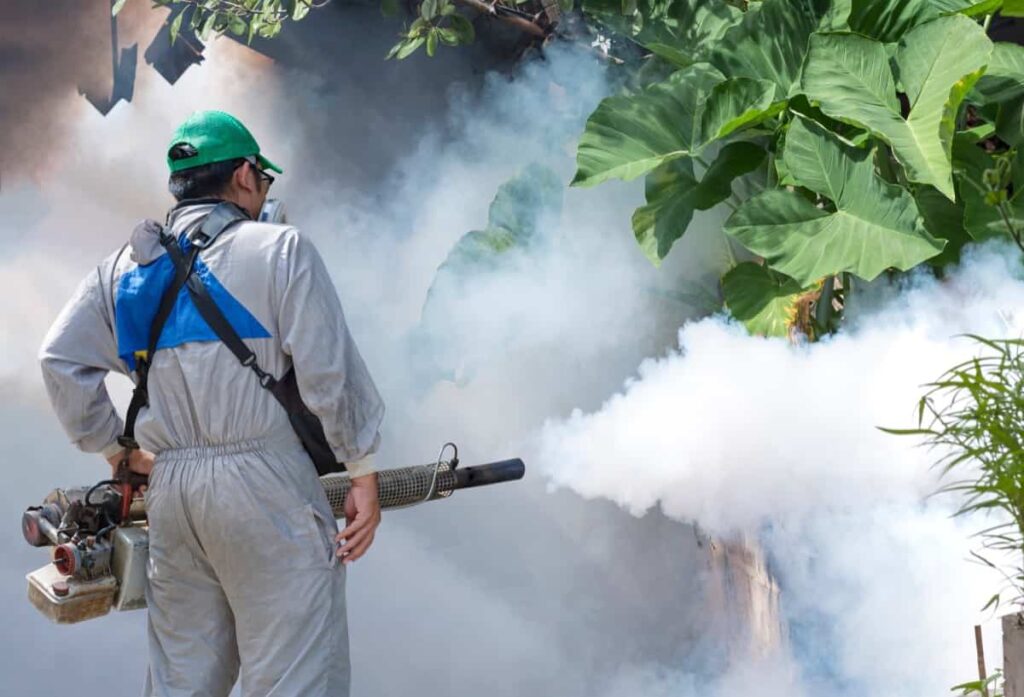
Mosquitoes: More than Just a Farm Annoyance
Mosquitoes can transmit diseases threatening animals, families, and the farm’s economic stability. With their abundant water sources, farms provide ideal breeding conditions for mosquitoes. However, livestock need help to feed adequately due to the constant presence of mosquitoes. The success of agricultural operations relies on the well-being of livestock, which provides nutritious food.
Disease prevention is crucial for ensuring the uninterrupted flow of the food supply chain. Mosquitoes target a wide range of warm-blooded creatures, including cows, horses, goats, and humans, making farms susceptible to their unwelcome presence. Therefore, preventing mosquitoes is an inconvenience and a serious threat to the farm’s health and sustainability.
Mosquito Life Cycle: A Key to Effective Control Measures
1. Egg Stage: Mosquitoes typically lay their eggs in stagnant water. These tiny, oval-shaped eggs can hatch in at least 48 hours, depending on environmental conditions such as temperature and humidity.
2. Larval Stage: Upon hatching, mosquitoes enter the larval stage, commonly called “wigglers.” Larvae are aquatic and feed on organic matter in the water. This stage lasts about one to two weeks.
3. Pupal Stage: Mosquitoes transform into pupae after the larval stage. Pupae are non-feeding and appear comma-shaped organisms, often called “tumblers.” This stage typically lasts two to four days.
4. Adult Stage: The final transformation leads to the emergence of adult mosquitoes from the pupal stage. These are the familiar, flying insects that bite and can transmit diseases. Adult mosquitoes feed on nectar and, in the case of females, blood for reproductive purposes.
Importance of Farm Mosquito Control
Mosquito-borne diseases significantly threaten livestock, disrupting feeding patterns and causing weight loss in cattle, sheep, and poultry. They also transmit diseases like encephalitis in horses and myxomatosis in rabbits. Modern farming, with its vast land, machinery, and structures, creates ideal breeding grounds for mosquitoes, making effective mosquito control crucial for maintaining healthy animals and providing safe, nutritious food. Recognizing this challenge is the first step toward mitigating the mosquito menace.
In case you missed it: Major Pests and Diseases of Cassava: Prevention and Control Methods

Implementing Integrated Pest Management Techniques for Mosquito Control on Farms
Integrated Pest Management (IPM) is a sustainable and cost-effective method for managing farm pest populations. It involves monitoring and assessing mosquito populations, introducing natural predators like dragonflies and fish species into stagnant water sources, and modifying the farm environment to discourage mosquito breeding. Chemical control is used when necessary, using targeted larvicides and adulticides based on scientific recommendations.
Environmentally friendly options are chosen to minimize collateral damage. Education and outreach are also essential to ensure a collaborative effort between farm workers and the community about mosquito biology and control measures. By implementing IPM, farmers can mitigate the risks associated with disease-carrying insects and maintain a healthy environment.
How to Control Mosquitoes on the Farm
Mosquito Breeding Grounds: Any standing body of water represents the ideal spawning ground for mosquitoes, including ponds, ditches, fields, and containers. Even seemingly innocuous objects like old tires, birdbaths, and clogged gutters can become mosquito breeding grounds if not properly managed.
Managing Natural Bodies of Water: Permanent natural bodies of water, such as ponds and wetlands, only sometimes support high mosquito populations due to the presence of predatory insects and fish. However, excessively weedy and shallow waterways receiving runoff from fertilizers can become havens for mosquitoes. Controlling excess runoff through proper drainage, minimal fertilizer use, and buffer zones can help.
Controlling Stagnant Pools: Natural streams can create stagnant pools as they meander through the property. To address this, thin rushes and cattails mow down shallow wetlands during dry seasons and dig small ditches to connect streams to pools.
Coastal Farm Considerations: Coastal farms must contend with standing water caused by tides or rain. Effective drainage can be achieved through ditches or levees with tide gates.
Impoundment Maintenance: Impounded water is attractive to mosquitoes unless properly maintained. This involves grading impoundment sides and bottoms, preventing overgrown vegetation, and stocking them with insect-eating fish.
Drain Field Ditches: Field ditches holding water for more than four days should be plowed following irrigation to prevent mosquito breeding.
Structural Maintenance: Leaky head gates or turnout structures can create stagnant water pools. Ensure proper construction to prevent water escape.
Road Maintenance: Small potholes and road ruts can collect stagnant water. Keep roads in good condition and clear roadside drainage areas to prevent water stagnation.
Lighting Strategy: Mosquitoes are attracted to light. Dim or turn off unnecessary lights, and consider using yellow incandescent or fluorescent lights in barns and stables, which are less attractive to mosquitoes.
Tree Hole Mosquito Control: Some mosquitoes breed in rainwater-filled tree holes. Drill a hole at the bottom of tree holes to avoid disturbing potential bird habitat.
Mosquito Traps: Use traps to capture mosquitoes, especially in large farms where locating every breeding site may be challenging.
Return Flow Systems: Reusing wastewater reduces mosquito breeding sites and conserves water and fertilizer. Wastewater can be pumped back into the irrigation system, reducing the need for additional resources.
In case you missed it: Common Tomato Pests and Diseases: Prevention, Treatment, and Control Management
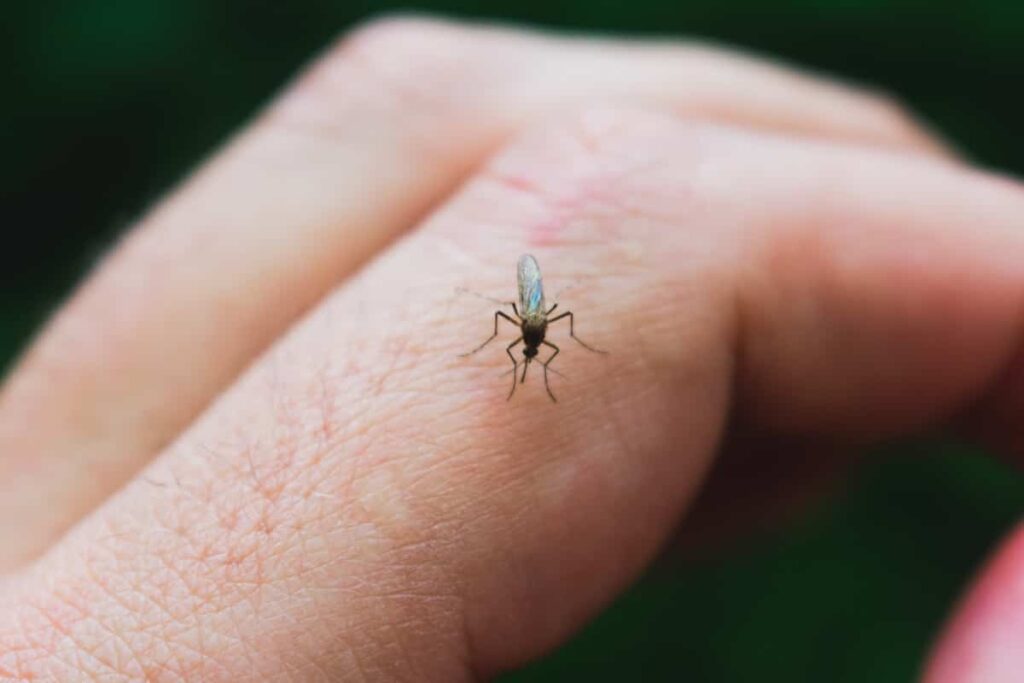
Identifying Common Mosquito Species and Their Habitats on Agricultural Land
Common mosquito species on agricultural land include Culex pipiens, Anopheles spp., and Aedes spp. Culex pipiens often breed in stagnant water, including artificial containers and ditches. Anopheles mosquitoes prefer clean, unpolluted water sources such as ponds and slow-moving streams.
Aedes mosquitoes, known for transmitting diseases like Zika and dengue, thrive in containers, discarded tires, and puddles. Understanding these species and their preferred habitats is essential for effective mosquito control on farms, enabling targeted interventions to reduce mosquito populations and protect livestock and crops from vector-borne diseases.
Creating a Mosquito-Friendly Farm Environment: Reducing Breeding Sites
To mitigate mosquito populations and minimize the risk of diseases they transmit, farms can implement measures to reduce breeding sites. Stagnant water is a major breeding ground for mosquitoes. Prevent or eliminate wastewater that has stood for more than four days. Proper irrigation management is essential, preventing surface water from lingering for extended periods.
Maintaining areas around ponds, ditches, and wetlands is equally vital. Containers like old tires, birdbaths, and clogged gutters should be properly managed to prevent water accumulation. By addressing these breeding sites, farms can significantly reduce mosquito populations, safeguarding the health of livestock, crops, and farmworkers while promoting a more sustainable and mosquito-free agricultural environment.
Utilizing Biological Control Agents for Mosquito Management on the Farm
Predatory insects like dragonflies and damselflies are natural mosquito predators and can be encouraged through habitat preservation. Certain fish species, such as Gambusia affinis (mosquitofish), are voracious mosquito larvae consumers. Farmers can harness nature’s mechanisms to reduce mosquito numbers sustainably by promoting these biological control agents.
Implementing Physical Barriers to Prevent Mosquito Infestations in Animal Housing
Mosquitoes can transmit diseases to livestock, impacting their health and productivity. Mesh screens on windows and doors effectively defend against mosquito entry while allowing ventilation. Netting or mesh around animal housing areas can also create a protective barrier, preventing mosquitoes from accessing animals. These physical barriers are scientifically proven methods to reduce the risk of mosquito-borne diseases and ensure the well-being of livestock.
In case you missed it: How to Manage Leaf Miners in Home Garden: Symptoms, Causes, Cultural, Biological, Chemical, Natural, and Organic Control
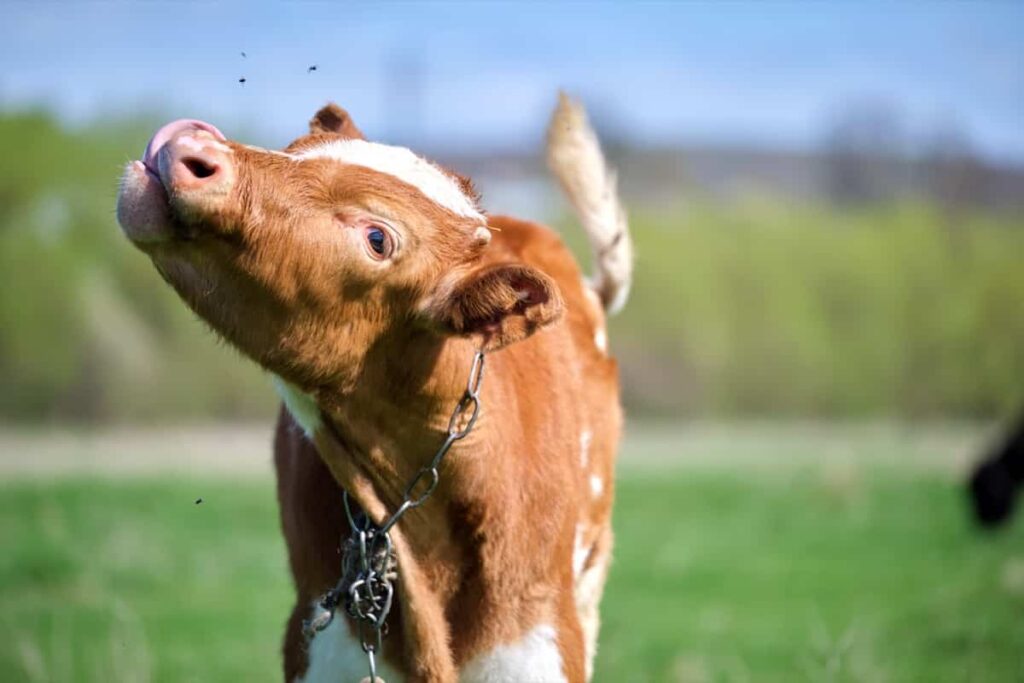
Applying Larvicides and Adulticides Safely and Effectively on Agricultural Land
Larvicides and adulticides are crucial tools for mosquito control on farms. Larvicides target mosquito larvae in breeding sites like stagnant water, disrupting their development. Common larvicides include Bacillus thuringiensis israelensis (BTI) and methoprene. Adulticides, like pyrethroids, target adult mosquitoes and are used when populations are high.
Applying these chemicals safely and per label instructions is crucial to minimize environmental impact and non-target species exposure. Integrated pest management (IPM) principles emphasize judicious chemical use, combining larvicides and adulticides with other effective and sustainable mosquito control strategies.
Incorporating Water Management Strategies to Minimize Mosquito Breeding Areas
Effective water management by minimizing mosquito breeding areas on farms. Stagnant water bodies are prime breeding grounds. Implementing proper drainage systems, maintaining ditches, and eliminating sources of standing water can reduce breeding opportunities. Smart irrigation practices, ensuring water doesn’t pool for extended periods, are essential. Additionally, creating habitats for natural mosquito predators like dragonflies and using biological agents like mosquitofish can help control mosquito larvae.
Using Mosquito-Repellent Plants and Essential Oils to Deter Mosquitoes on the Farm
Mosquito-repellent plants like citronella, lavender, and basil can be strategically planted around farm areas to deter mosquitoes naturally. These plants emit scents that mosquitoes find unpleasant, reducing their presence. Essential oils extracted from these plants, such as citronella oil, can create natural repellents for animals and humans. When applied correctly, these botanical solutions provide effective mosquito control, minimizing the need for chemical interventions.
Educating Farm Workers on Personal Protective Measures against Mosquito Bites
Farm workers are at a higher risk of mosquito-borne diseases due to outdoor exposure. To protect them, they should be educated on personal protective measures. These include using EPA-approved mosquito repellents, wearing protective clothing like long-sleeved shirts, pants, and hats, ensuring access to mosquito nets for sleeping, and knowing peak mosquito activity times. They should also be trained to identify and report stagnant water sources for mosquito control. Lastly, they should be taught to recognize symptoms of mosquito-borne diseases for early diagnosis and treatment.
Implementing Proper Waste Management Practices to Reduce Mosquito Populations
Mosquitoes thrive in stagnant water, accumulating in discarded containers and waste materials. Implementing proper waste disposal practices, including covering or removing containers that can collect water, reduces mosquito breeding sites. Regularly cleaning gutters, eliminating standing water in discarded tires or containers, and disposing of organic waste properly are essential steps. By managing waste diligently, farms can significantly decrease mosquito breeding opportunities, mitigating disease risk and creating a healthier environment for humans and animals.
In case you missed it: Top 15 Effective Organic Home Remedies for Garden Pests: Proven Control Methods
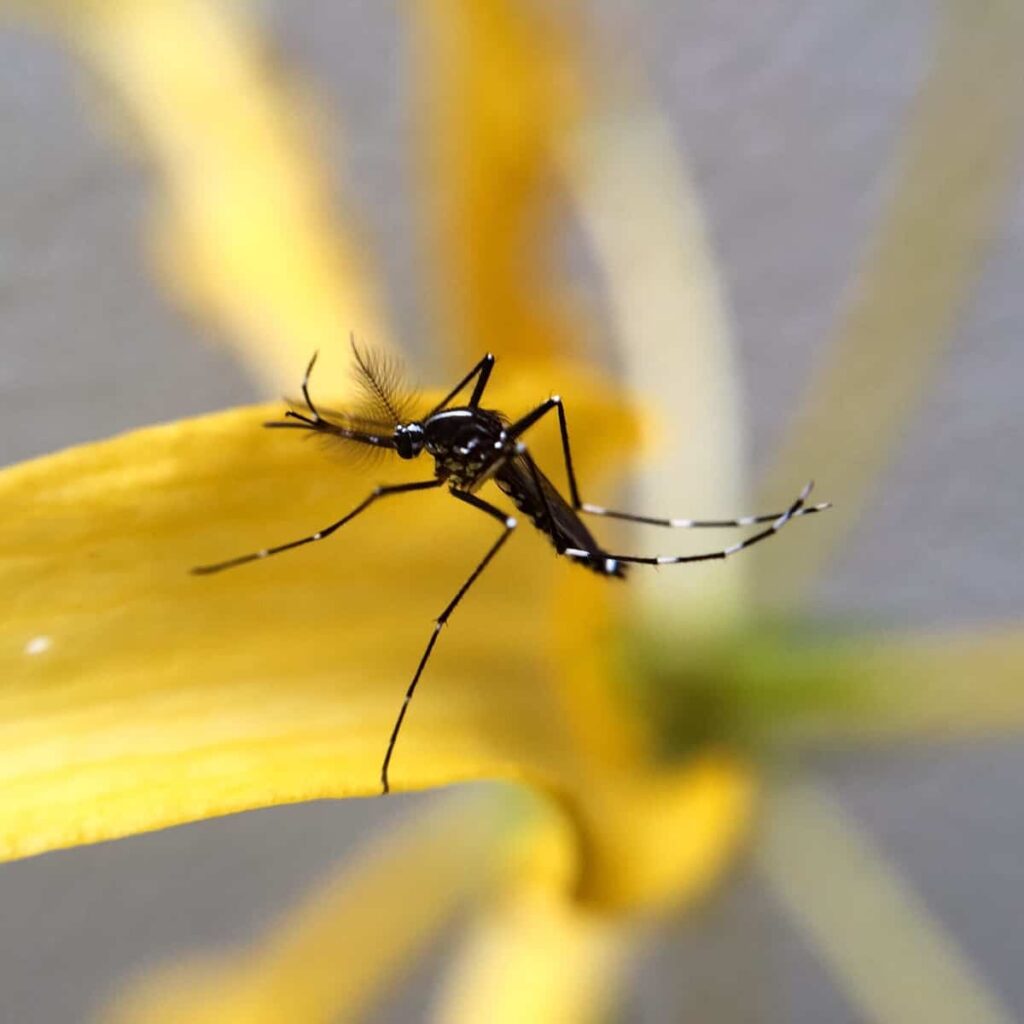
Installing Mosquito Traps and Monitoring Systems for Early Detection and Control
Installing mosquito traps and monitoring systems is a proactive approach to early mosquito control on farms. These traps attract and capture mosquitoes, providing valuable data on species and population levels. Early detection allows timely intervention, reducing the need for extensive chemical control. By strategically placing these traps, farmers can identify problem areas, implement targeted measures, and minimize the risk of mosquito-borne diseases.
Employing Animal Husbandry Practices to Minimize Attractiveness to Mosquitoes
Maintaining proper hygiene and sanitation in animal housing areas minimizes factors that attract mosquitoes, such as stagnant water, manure, and organic debris. Additionally, it can be beneficial to select breeds of livestock that are less attractive to mosquitoes or exhibit resistance to certain diseases transmitted by them. Scientific research has shown that implementing these practices reduces mosquito infestations and promotes livestock’s overall health and productivity.
Implementing Crop Rotation and Plant Diversity for Natural Mosquito Control
By rotating crops and diversifying plant species, farmers disrupt the mosquito life cycle. Mosquitoes often lay their eggs in or near specific crops or plants. When different crops are grown in succession, and various plant species are introduced, it confuses and disrupts mosquito breeding patterns. This reduces the availability of suitable breeding sites, ultimately decreasing mosquito populations without chemical intervention.
Collaborating with Local Authorities and Experts for Effective Mosquito Control Strategies
Collaboration with local authorities and experts is crucial for developing effective mosquito control strategies. Local authorities monitor and manage mosquito populations, allocate resources, and coordinate disease control efforts. Experts provide insights into local mosquito species, behaviors, and scientific approaches. By working together, farms can access knowledge and resources for evidence-based mosquito control measures, safeguarding agricultural operations, public health, and community well-being.
In case you missed it: Pomegranate Fruit Fly: Symptoms, Treatment, Effective Management, Chemical, and Organic Control
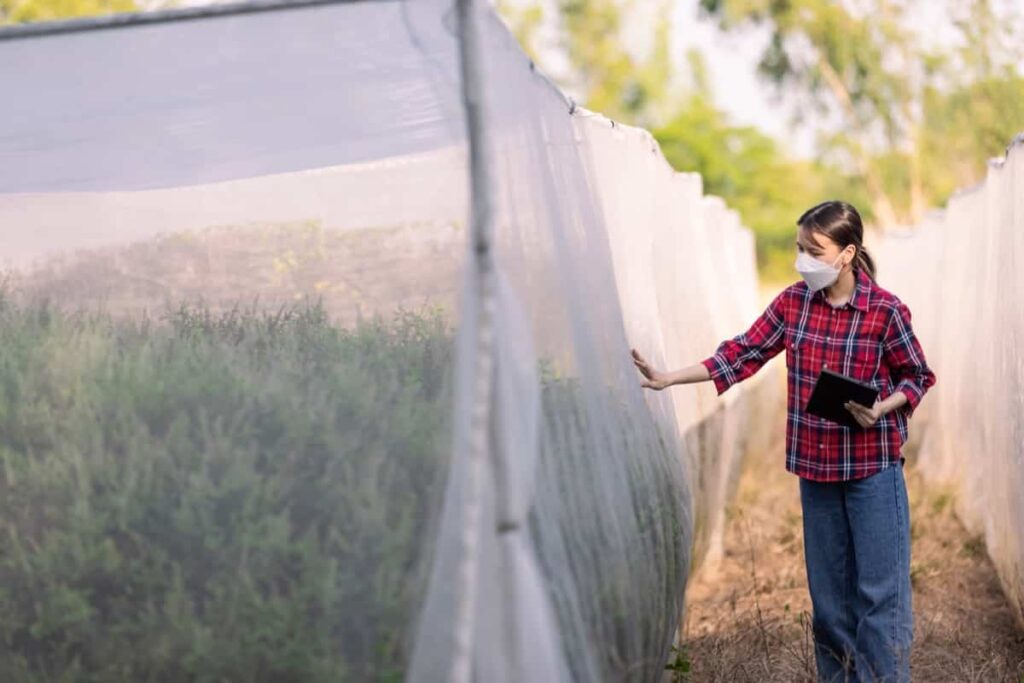
Conclusion
Effective mosquito control on farms is vital for the well-being of animals, crops, and laborers. Strategies like water management, natural predators, and educational initiatives can mitigate disease risks and promote sustainable agriculture. Collaborating with experts and local authorities further enhances mosquito control, ensuring a healthier farming environment.
- Aquaponic Farming at Home: A Step-By-Step Guide
- Profitable Village Farming Business Ideas in 2024
- High-Yield Aquaculture: Fast-Growing Fish for Farming
- Effective Fish Pond Construction Techniques for Beginners
- Irrigation and Water Management in Pineapple Farming
- Blossom to Harvest: Mastering Flowering and Pollination in Papaya Farming
- Pig Fattening Essentials: From Selection to Sale for Beginners
- Raising Wagyu Cattle: A Complete Guide for Premium Beef Production
- Soil Types and Their Water Holding Capacity
- Optimizing Irrigation Schedules for Coconut Groves for Enhanced Yield
- Espresso Your Garden: Coffee Grounds for Healthier Acid-Loving Plants
- The Best Soil Mix for Snake Plants: How to Mix Your Own Snake Plant Soil
- Green Thumb Success: Expert Tips for Cultivating Greenhouse Beans All Year Round
- Bloom All Year Round: The Ultimate Guide to Indoor Hyacinth Care
- Eco-Friendly Gardening: How to Make Liquid Fertilizer from Kitchen Waste
- Ultimate Guide to Grow Anise in Pots: Explore Seed Propagation to Harvesting
- Guide to Raising Chester White Pigs: Discover Breed Facts to Growth Management
- Mastering the Elegance: The Ultimate Guide to Weeping Cherry Tree Care, Planting, and Maintenance
- Ultimate Guide to Planting Garlic in Grow Bags: Growing Strategies for Beginners
- How to Fix Spider Plant Leaf-Related Problems: Natural and Organic Remedies
- 10 Reasons Why Your Tulsi Plant is Shedding Leaves: Home Remedies and Solutions
- Optimizing Growth and Yield: The Advantages of Palm Bunch Ash Fertilizer
- Utilizing Neem Oil Extract as a Natural Pesticide for Hydrangea
- From Soil to Harvest: Various Ways in Which Farmers Can Use AI Tools
- Steps to Encourage and Induce Citrus Flowers: A Comprehensive Guide
- How to Fix Snake Plant Leaf-Related Issues: Natural and Organic Remedies
- Transform Your Garden into a Fragrant Oasis with Raat Ki Rani (Night Blooming Jasmine)
- Discover the Ideal Chicken Breeds for Philippine Farms
- How to Create a Poultry Egg Farm Business Plan for Profits
- Grow Lemon Cucumbers Like a Pro: Insider Techniques for Bountiful Yields
- Ultimate Guide to Caring for Your Pink Princess Philodendron: Tips for Thriving Variegation
- Areca Nut Profit Per Acre: Calculating Yield and Cost of Cultivation
- How Kaveri Chicken is Becoming a More Profitable Breed in Indian Backyards
- Transform Your Barn: 9 Steps to Convert a Horse Stall into a Chicken Coop
- Exploring Suffolk Sheep Disadvantages with Limitations and Challenges
- Guide to Solving Potted Lemon Tree Problems: How to Revive Lemon Tree in Containers
